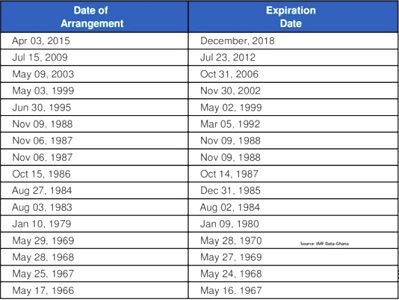
Is there cause for apprehension in turning to Bretton Woods Institutions?
It's a fact that the Bretton Woods Institutions (BWIs) are influential in shaping the structure of the world’s development and financial order of their 190 members. However, many remain sceptical of the institutions because of their antecedents as the surrogate of western imperialism.
BWIs were significantly influenced by the US geopolitical strength; nonetheless, their mandates, focus and programmes have evolved greatly over time to help ease liquidity and balance of payments constraints for members finding it difficult to attract capital at affordable rates.
Advertisement
Their missions started shifting for the first time under President Robert McNamara to focus on income inequality and poverty. They currently have the twin goals of eliminating extreme poverty by 2030 and boosting shared prosperity.
It will be counterintuitive to deliberately hurt economies subscribing for help timeously, not when in dire straits and needing urgent 'surgery' to survive. Such vulnerabilities only call for bitter pills.
Washington Consensus
From Washington Consensus, it has become what is now referred to as the “Knowledge Bank”, a repository of ‘development expertise’, pushing fiscal consolidation measures, including reducing public wage bill, improving taxes regime, labour flexibilities, rationalising and privatising social services, and targeting social protections and subsidies, while maintaining low levels of inflation, corporate taxation rates and trade tariffs at the macroeconomic level.
Member nations exercise their inalienable right to freely belong, in spite of averred scepticism and reservations.
Critique of the BWI has been the so-called conditionality which tends to undermine sovereignty of borrower nations, limiting their ability to make policy decisions and eroding ownership of national development strategies.
While historically, the BWIs enforced conditionality primarily through Structural Adjustment Programmes (SAPs), today, the International Monetary Fund (IMF) requires a ‘letter of intent’ with prior actions, quantitative performance criteria and structural benchmarks on macroeconomic policy reforms from governments requesting a loan.
In the aftermath of the 2008 financial crisis, the ‘pro-cyclical’ approach was criticised for leading to a decline in economic activity, leading to lower consumption, lower public revenues, lower investment in vital public services and higher levels of inequality, which in turn lowers growth, not addressing balance of payments distress.
Perhaps what is more important is to keep pushing the frontiers for a level-playing field and win-win outcomes for member countries.
As we keep evolving by the day, it is heartwarming to note the current stated aims of the fund as promoting international fiscal and monetary cooperation, securing international financial stability, facilitating international trade, promoting high employment and sustainable economic growth via multilateral macroeconomic surveillance.
Misconceptions
There are so many misconceptions surrounding BWIs. Their pronouncements on domestic policies can lead to important positive reactions by ‘the market’, thereby potentially increasing financing options.
Unknown to many, BWIs money is cheap, with diverse products.
Some of which are even interest rate free as much as member states keep within their quota, beyond which a paltry rate of two per cent kicks in.
Products such as Rapid Finance Instrument (RFI), Flexible Credit Line (FCL), Rapid Credit Facility (RCF), Precautionary and Liquidity Line (PLL) and Stand-By Arrangements (SBA) are virtually without conditionality.
Some facilities are interest free with moratorium irrespective of amount involved. All these facilities can be contrasted with Ghana’s not-too-distant past seven-year $1 billion Eurobond, which attracted market interest rate of 7.75 per cent.
It will be interesting to play out the records of vindication on the country’s growth trajectory in all the 17 times Ghana has been with the BWIs vis-a-vis being on our own.
We have less to virtually no option than to bite the bullet and swallow the bitter pill soonest than letting things degenerate before looking the direction of the BWIs. Ghana’s economy is troublingly hobbled by external and internal factors, all exposing the nation to swings in investor sentiments.
I do not, therefore, think E-Levy and BWIs are mutually exclusive, with a magic wand to get us off the quagmire.
Indecision is as worse and dangerous path to tread as getting good and bold initiatives wrong.
Rwanda’s success story has become well known in recent years, but the breadth, pace and most importantly the “how” require special attention as a classical guide.
Beyond dining with BWIs, our best bet will be to strategically and carefully direct public investment to restructure the Ghanaian economy towards activities with higher returns to productivity and growth acceleration, whilst improving resilience to external shocks.
Another major challenge beyond the fund's programme will be maintaining our discipline and significantly nipping the tremendous wastage and leakages in the system in the bud without losing momentum on the growth of internal revenue generation.
The writer is a risk and compliance manager at Provident Insurance Company.




